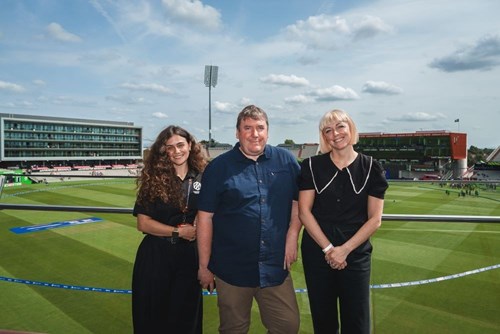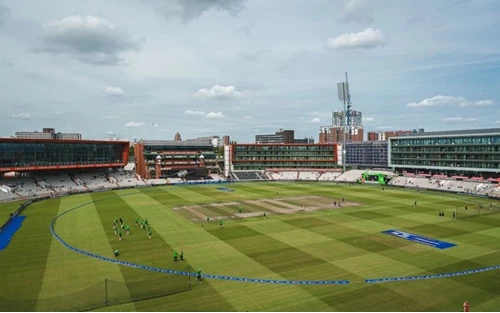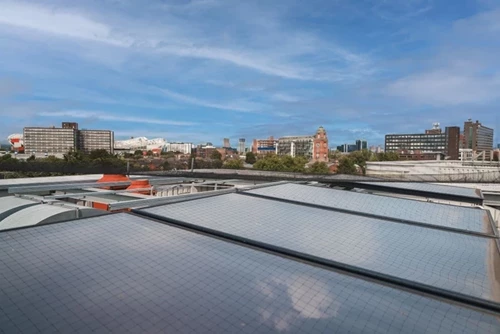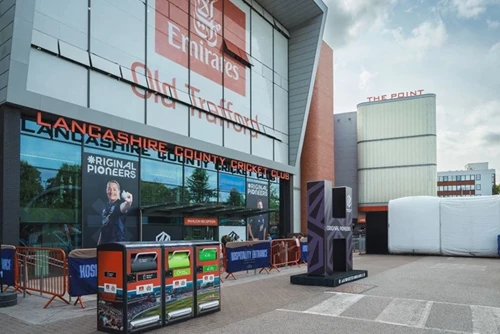Background
In 2015, the England and Wales Cricket Board (ECB), the governing body for professional and recreational cricket, restructured its facilities department to unify oversight of both grassroots and professional cricket venues. This reform highlighted a critical gap: while some venues were independently advancing sustainability initiatives, others were at the beginning of their planning process. With no formal environmental strategy in place, and rising fixed costs, the ECB recognised they needed support to progress action.

Lauren Babington, Sustainability Manager at Lancashire Country Cricket Club, Terry Watson, England and Wales Cricket Board and Amy House, Director of Green Economy.
The Challenge
The ECB looked to develop a cohesive, scalable environmental strategy to establish a national position on sustainability, enabling consistent reporting and informed decision-making. This was of increasing importance for the game to take positive action, whilst enabling venues to compete in the lucrative hospitality market.
This strategy needed to be scalable to support clubs of all sizes in starting or accelerating their sustainability journey, whilst demonstrating return on investment to prioritise action.

Our Approach
Green Economy (formerly Enworks) was commissioned to lead a comprehensive review and strategy development process. Our work included:
- Onsite reviews: Visiting all professional cricket venues to assess existing energy use, resource efficiency and operational challenges at both large and small venues.
- Carbon footprinting: Developing a framework by which the ECB could understand its Scope 1, 2 emissions and identify areas of the business where changes could be made.
- Strategy development: Creating a practical, scalable environmental strategy tailored to the needs of both professional and grassroots venues across the country.
- Knowledge transfer: Equipping decision-makers with the tools, data, and confidence to act, and aligning funding with action plans.

Case in Focus: Lancashire County Cricket Club
Green Economy piloted some of this work at Lancashire County Cricket Club, providing enhanced one-to-one support to build a comprehensive carbon reduction plan which led to Solar PV installation across the site. This work has led to the club delivering and scheduling several projects including:
- Full LED lighting transition, including indoor facilities.
- Complete boiler replacement and upgraded building management systems.
- Power ring upgrade, eliminating most of the need for diesel generators.
- New waste contract with on-site separation.
- Participation in national campaigns like Sky’s Green Travel initiative and the Greater Manchester Combined Authority’s #PlasticFreeGM
- Installation of EV charging points
- Borehole systems for irrigation.

Project outcomes
Following completion of Green Economy’s project, the ECB have seen the multiple outcomes
- The ECB Environmental Sustainability plan for cricket: this project informed the national sustainability strategy for the game which was published in 2023 and individual professional clubs are now producing their own plans informed by the strategy.
- Sustainability Manager: appointment of an ECB sustainability manager to coordinate and take forward this work
- Enhanced Monitoring: Improved energy monitoring processes to ensure decisions are backed by data. For instance, it was widely assumed that floodlights were a major contributor to emissions, but reporting found that baseline energy was far more significant.
- Operational Efficiency: Clubs with stretched operations teams, or run by volunteers now use standardised project recommendations to prioritize actions and secure buy-in.
- National Reporting: The ECB has reported its carbon footprint, including SECR-compliant Scope 1, 2, and 3 emissions, in its Annual Report for three consecutive years.
- Signed up to the UN’s sports for climate action framework: following the work the ECB formalised the strategy by committing to this international framework for the sector.

Bruce Cruse, Director of Facilities & Infrastructure, ECB said:
“The work we commissioned Green Economy to deliver has been fundamental to establishing our environmental strategy, whilst providing practical tools for venues to use.
“Clubs across the country now have a clear roadmap, with many accessing funding and support based on the strategy’s recommendations and the development of their own plan.”





